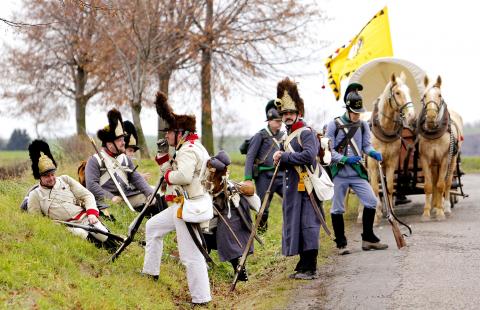The single line of Napoleon’s secret code told Paris of his desperate, last order against the Russians: “At three o’clock in the morning, on the 22nd I am going to blow up the Kremlin.”
By the time Paris received the letter three days later, the Russian czar’s seat of power was in flames and the diminished French army was in retreat. Its elegantly calligraphic ciphers show history’s famed general at one of his weakest moments.
“My cavalry is in tatters, many horses are dying,” said Napoleon, the once-feared leader showing the strain of his calamitous Russian invasion, which halved his army.

Photo: Reuters
The rare document — dated Oct. 20, 1812, signed “Nap” in the emperor’s hand and written in numeric code — is up for auction today at France’s Fontainebleau Auction House.
The Napoleon code, used only for top-secret letters when the French emperor was far from home, aimed to stop enemies from intercepting French army orders. The code was regularly changed to prevent it from being cracked.
Napoleon must have dispatched his strongest horses and riders to carry the news: It only took three days to reach France’s interior ministry —2,480km across Europe.
“This letter is unique. Not only is it all in code, but it’s the first time we see this different Napoleon. He went into Moscow in 1812 at the height of his power. He returned profoundly weakened. In Moscow, the Russians had fled days before and burnt down the city. There was no victory for Napoleon, nor were there any provisions for his starving, dying army,” Jean-Christophe Chataignier of the auction house says.
The only thing left for the weakened leader was to give the order to burn Russia’s government buildings — coded in the letter as “449, 514, 451, 1365.”
It is evidence of what historians call the beginning of the end of Napoleon’s glorious empire, which started in Russia and ended at Waterloo three years later.
In June 1812, Napoleon’s “Grand Army” — at 600,000 men one of the largest in human history — confidently entered Russia. However, they were woefully unprepared for the harsh weather, the strong Russian defense and the Russian scorched-earth tactics, which left nothing behind to sustain the hungry and freezing French troops.
“This letter is an incredible insight, we never see Napoleon emotively speaking in this way before,” Chataignier says. “Only in letters to [his wife] Josephine did he ever express anything near to emotion. Moscow knocked him.”
In the text — which announces that his commanders are evacuating Moscow — Napoleon laments his army’s plight, asking for assistance to replenish his forces and the ravaged cavalry, which saw thousands of horses die.
The 1812 victory over the French played an important role in Russia’s emergence as a major world power. Until World War I, Napoleon’s Russian campaign and the ensuing wars were the largest European military face-off in history.
The letter, which is accompanied by a second decoded sheet, is estimated to fetch up to 15,000 euros (US$19,480).

VAGUE: The criteria of the amnesty remain unclear, but it would cover political violence from 1999 to today, and those convicted of murder or drug trafficking would not qualify Venezuelan Acting President Delcy Rodriguez on Friday announced an amnesty bill that could lead to the release of hundreds of prisoners, including opposition leaders, journalists and human rights activists detained for political reasons. The measure had long been sought by the US-backed opposition. It is the latest concession Rodriguez has made since taking the reins of the country on Jan. 3 after the brazen seizure of then-Venezuelan president Nicolas Maduro. Rodriguez told a gathering of justices, magistrates, ministers, military brass and other government leaders that the ruling party-controlled Venezuelan National Assembly would take up the bill with urgency. Rodriguez also announced the shutdown

Chinese President Xi Jinping’s (習近平) purge of his most senior general is driven by his effort to both secure “total control” of his military and root out corruption, US Ambassador to China David Perdue said told Bloomberg Television yesterday. The probe into Zhang Youxia (張又俠), Xi’s second-in-command, announced over the weekend, is a “major development,” Perdue said, citing the family connections the vice chair of China’s apex military commission has with Xi. Chinese authorities said Zhang was being investigated for suspected serious discipline and law violations, without disclosing further details. “I take him at his word that there’s a corruption effort under

China executed 11 people linked to Myanmar criminal gangs, including “key members” of telecom scam operations, state media reported yesterday, as Beijing toughens its response to the sprawling, transnational industry. Fraud compounds where scammers lure Internet users into fake romantic relationships and cryptocurrency investments have flourished across Southeast Asia, including in Myanmar. Initially largely targeting Chinese speakers, the criminal groups behind the compounds have expanded operations into multiple languages to steal from victims around the world. Those conducting the scams are sometimes willing con artists, and other times trafficked foreign nationals forced to work. In the past few years, Beijing has stepped up cooperation

Exiled Tibetans began a unique global election yesterday for a government representing a homeland many have never seen, as part of a democratic exercise voters say carries great weight. From red-robed Buddhist monks in the snowy Himalayas, to political exiles in megacities across South Asia, to refugees in Australia, Europe and North America, voting takes place in 27 countries — but not China. “Elections ... show that the struggle for Tibet’s freedom and independence continues from generation to generation,” said candidate Gyaltsen Chokye, 33, who is based in the Indian hill-town of Dharamsala, headquarters of the government-in-exile, the Central Tibetan Administration (CTA). It